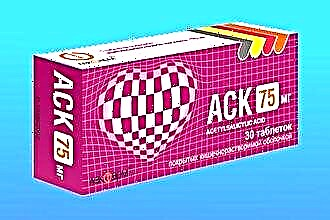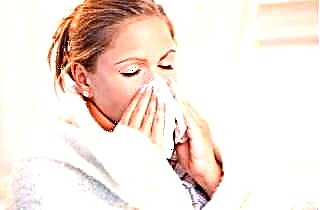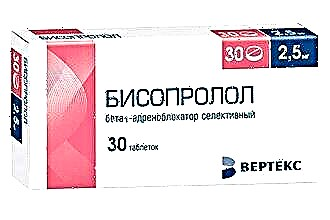Allergic rhinitis is one of the most common but late diagnosed diseases in children. Lachrymation, rhinorrhea, nasal congestion and intermittent cough are unpleasant symptoms that occur when the mucous membrane in the nasal cavity is inflamed. How is allergic rhinitis treated in children?
 Before contacting a specialist, parents can only identify and eliminate allergens that have caused inflammation of the ENT organs. Most often, they are animal hair, gassed air, dust, fungal spores, drugs or food. It is not always possible to independently identify provoking agents.
Before contacting a specialist, parents can only identify and eliminate allergens that have caused inflammation of the ENT organs. Most often, they are animal hair, gassed air, dust, fungal spores, drugs or food. It is not always possible to independently identify provoking agents.
In this case, the doctor can prescribe allergy tests to the little patient. With their help, it is possible to establish for sure and, accordingly, exclude causal allergens.
Treatment principles
How is an allergic rhinitis treated? Only in the case of undergoing complex therapy can the progression of the disease and the development of complications be prevented. Very often, parents mistake rhinorrhea and sneezing for symptoms of ARVI. However, taking antiviral medications does not give positive results. Moreover, inadequate treatment in some cases causes the spread of inflammation to the bronchi, larynx and lungs.
Only the attending physicians - otolaryngologist, immunologist, allergist, pediatrician, etc. can draw up an optimal scheme for hyposensitizing therapy. In this case, the treatment of the disease consists in performing the following therapeutic measures:
- improving the home environment - regular airing of the children's room, humidifying the air and wiping horizontal surfaces from dust;
- adherence to a hyposensitizing diet - exclusion from the diet of foods with a medium and high degree of allergenicity (red fish, citrus fruits, yoghurts with fillers, legumes, honey, milk, etc.);
- undergoing drug therapy - taking antihistamines, anti-inflammatory, wound healing, decongestants;
- physiotherapy - rinsing the nasopharynx with isotonic solutions based on sea salt.
If you diagnose the disease in time and start taking medications, it will be possible to eliminate the allergic rhinitis in the child within 5-7 days. Parents should be aware that not taking a problem seriously can have serious consequences.
According to statistics, about 35% of children under 3 years of age with manifestations of chronic allergic rhinitis develop bronchial asthma.
Barrier drugs
How to treat seasonal allergic rhinitis? Hay fever (seasonal allergic rhinitis) is exacerbated during periods of flowering wind-pollinated plants. Even after calculating the allergen, it is not always possible to prevent contact with it. What to do in this case?
Manifestations of hay fever can be stopped with the help of barrier drugs. The composition of nasal drops and sprays contains components due to which a protective film is formed on the surface of the nasopharyngeal mucosa. It prevents the penetration of allergens into soft tissues, thereby preventing inflammation.
If your child suffers from seasonal rhinitis, it will be possible to eliminate its manifestations with the help of drugs such as Nazaval and Prevalin. They will not be able to cure an allergy, but they will surely stop its manifestations. Pediatricians warn that the injection of fine solutions into the nasal passages can cause laryngospasm. Therefore, they are not recommended for use in the treatment of babies under 3-4 years old.
Antihistamines
 Treatment of allergic rhinitis in children should be accompanied by antihistamines. They belong to a group of drugs with etiotropic action. In other words, antihistamines directly affect the cause of allergies. They contain substances that interfere with the release of histamine from mast cells, which is the culprit for inflammation of the nasopharynx.
Treatment of allergic rhinitis in children should be accompanied by antihistamines. They belong to a group of drugs with etiotropic action. In other words, antihistamines directly affect the cause of allergies. They contain substances that interfere with the release of histamine from mast cells, which is the culprit for inflammation of the nasopharynx.
Antiallergic medications can relieve itching in the nose, persistent sneezing, nasal congestion, rhinorrhea and lacrimation. In pediatric practice, third-generation antihistamines are used to eliminate the symptoms of hay fever. They practically do not cause side reactions, therefore, they can be included in the allergy treatment regimen even in the smallest patients:
- Telfast;
- Claritin;
- "Allergodil";
- Fenistil;
- "Zyrtek".
Important! An overdose of nasal antiallergic drops can lead to nosebleeds.
Local hormonal agents
Most parents believe that hormonal drugs are more harmful to health than helping to cope with illness. Until recently, corticosteroid drugs did cause a lot of side effects, so they tried not to use them to treat children. However, today there are many completely safe intranasal glucocorticosteroids that can be safely used to relieve inflammation in the nasopharynx.
They contain hormones that really prevent inflammation in the mucous membranes of the respiratory tract. With the systematic administration of medications, it is possible to eliminate nasal congestion, rhinorrhea and lacrimation in just a few days. The safest hormonal medications include:
- Beclomethasone;
- "Budesonide";
- Difluocortolone;
- "Mometasone";
- "Prednikarbat".
Fluoridated hormonal drugs are considered safe, which are practically not absorbed into the systemic circulation and have only a local effect.
However, it should be borne in mind that an overdose of even such corticosteroids can lead to a decrease in immunity and, as a result, the development of mycotic flora in the nasopharynx.
Other drugs
To quickly eliminate allergic rhinitis in a child, you need to use drugs not only etiotropic, but also symptomatic. In addition, herbal adaptogens and cromones, which can be used for prophylactic purposes, will help reduce the likelihood of re-developing the disease. Typically, when diagnosing hay fever in children, use:
| Drug group | Name | Operating principle |
|---|---|---|
| vasoconstrictor | "Nazol" "Knoxprey" "Nazonex" | increase the patency of the nasal passages and facilitate nasal breathing |
| cromones | "Kromoheksal" "Kromosol" "Intal" | stabilize the state of mast cell membranes, prevents the penetration of histamines into the blood |
| enterosorbents | "Filtrum" "Enterosgel" "Polysorb" | remove toxins and allergens from tissues, contribute to desensitization of the body |
| plant adaptogens | Lemongrass Aralia Manchurian Ginseng | stimulate the immune system, increase the body's resistance to the action of pathogenic agents |
| leukotriene antagonists | "Singular" "Zileuton" "Montelukast" | reduce the sensitivity of allergic receptors to the action of inflammatory mediators, as a result of which allergic reactions are stopped |
| solutions for sanitation of the nasopharynx | Rotokan Humer Aquamaris | liquefy and remove mucus from the nose, promote healing of the mucous membranes of the nasopharynx |
The dosage and duration of medication should be determined only by the attending specialist. With the correct and timely use of pharmaceutical preparations, it is possible to eliminate the main manifestations of allergies within a week.



